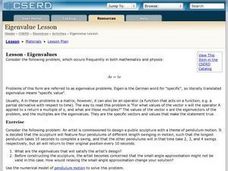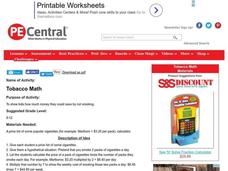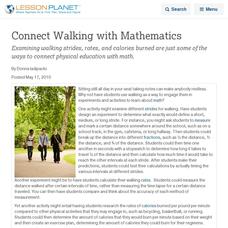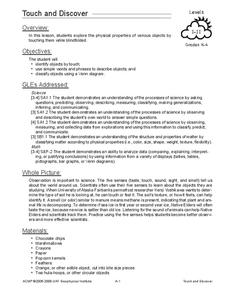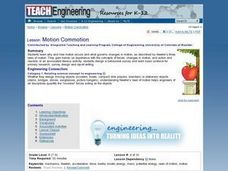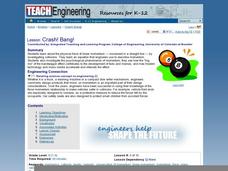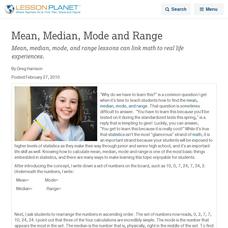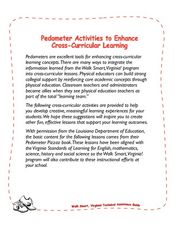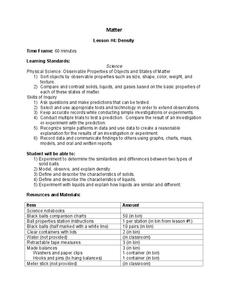Curated OER
Physics: Eigenvalues
Students solve problems by discovering the eigenvalues that satisfy design questions. They explain how relaxing a small angle approximation can change the solution. Students apply the numerical model of pendulumm motion to solve the...
Curated OER
Physics: Angular Solution of Hydrogen Atom
Students discover the angular solution of hydrogen activity. Depending on the undergraduate course, this activity can illustrate eigenvalue problems, to introduce Shrodinger's equation and particle wave duality, or to introduce...
Curated OER
The Math of Light
Investigate light intensity, illuminance, and power consumption of different light source.Compare the efficiency of light bulbs then create a persuasive advertisement about it.
Curated OER
Physics: Visualization of Hydrogen Wave Functions
Students explore various methods for visualizing the results of hydrogen wave function. They observe trends using a polar plot tool and make plots for the first three energy levels of the radial wave function for hydrogen. Students apply...
Curated OER
Connect Walking with Mathematics
Examining walking strides, rates, and calories burned are just some of the ways to connect physical education with math.
Curated OER
Touch and Discover
Young scholars identify the physical properties of items using the sense of touch. In this touch and discover lesson, students describe items. Young scholars sort items using a Venn diagram.
Curated OER
Science: Motion Commotion
Young scholars examine Newton's three laws of motion to discover what causes it and how it changes. They conduct motion experiments by building catapults and constructing balloon rockets. Finally, they conduct peer studies correlating...
Curated OER
Crash! Bang!
Students study the physical force of linear momentum by investigating collisions. They analyze the difference between elastic and inelastic collisions. They calculate linear momentum.
Curated OER
Mean, Median, Mode and Range
Mean, median, mode, and range lessons can link math to real life experiences.
Curated OER
Analyzing 3-D Shapes and 2-D Representations
Students can analyze 3-D objects better with actual physical models and by also drawing 2-D representations of them.
Curated OER
Animals, Animals, Everywhere
Fourth graders participate in a variety of activities dealing with animal characteristics and classifications in this multi-task activity. They use graphic organizers, make booklets, and make models.
Curated OER
The Magic School Bus Plays Ball
Students learn along with Ms. Frizzle's class. In this Magic School Bus lesson plan, students work in small groups to find how movement changes when there is more - and less - friction.
Curated OER
Layers of the Earth: Plate Tectonics
Sixth graders participate in a instructional activity that is about investigating the different layers of the earth and defining how the plates move over the mantle. They engage in a variety of activities and use mathematics to create...
Curated OER
Castles and Cornerstones
Students become familiar with the style of architecture of medieval times. In this architecture lesson plan, students design a model of a medieval castle including its cornerstone. Students understand scale in their representation.
Curated OER
Sounds Good to Me
Students determine density and hardness of wood samples based on several investigations. In this physical science and music lesson, students visit four centers and perform tests on wood samples to determine densities and hardnesses. They...
Curated OER
Exponential Decay
Students study exponential decay and its application to radiocarbon dating. In this exponential decay lesson, students use candy to model the time it takes for something to decay. Students also graph the data they collect and...
Curated OER
Vernier - A Speedy Slide with EasyData™ App and CBR 2™
Mathematicians use a CBR 2™ motion detector to determine their speed or velocity going down a playground slide. They also experiment with different ways to increase their speed going down the slide. Finally, students complete the Student...
Curated OER
Y-Intercept and Slope Intercept Form
Alegebra amateurs identify the slope and the y-intercept given a linear equation in slope-intercept form by correctly completing some in class problems. They write the linear equation in slope-intercept form that corresponds to the given...
Curated OER
Pedometer Activities to Enhance Cross-curricular Learning
Young scholars complete different activities involving pedometers such as writing a creative story, calculating step averages, researching pedometers, calculating calories, and much more.
Curated OER
Density
Learners predict when an object will float or sink based on comparison of density of the object to the density of the substance in which it is placed. The access a website and sketch the object in the first column of their table and then...
Curated OER
Sippin' on Smoothies
Why is calcium good for the body? Where is it stored? Young chefs discover the importance of calcium and review a list of foods that are rich in the material. They then make delicious smoothies high in calcium! Teaching kids how to...
Curated OER
Stochastic and Deterministic Modeling
Explore the difference between stochastic and deterministic modeling through programming. First have the class write algorithms for relatively simple tasks using pseudocode. Use the Python 2.7 program app to simulate Mendel's Pea Pod...
Curated OER
Iron For Breakfast
Third graders are challenged to use scientific thinking, they experiment and observe which objects are attracted to a magnet. Pupils use the evidence to construct an explanation as to what common property the objects attracted to a...
